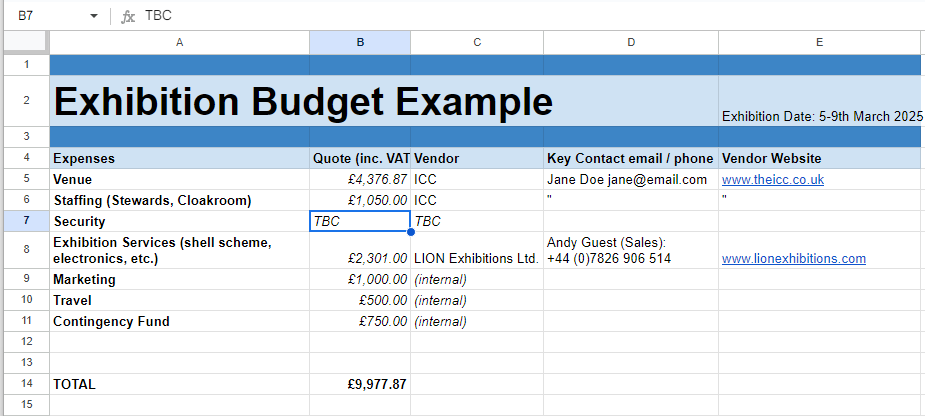Build Your Exhibition Budget
Organising and hosting a trade show requires a huge capital investment. The returns are well worth it, with exhibitor fees, sponsorships and ticket sales, but it must be well managed to be a success. A solid budget for your industry expo will help you assess:
- How much to charge for exhibitor spaces
- How to set ticket prices
- Your expected ROI.
How do exhibition organisers rise to the challenge of managing a large budget? We’ve put together some advice and useful links to help make sure you don’t miss a thing.
More Support and Advice for Planning a Trade Show, Expo or Exhibition
How Much Does It Cost To Host A Trade Show/Exhibition?
The average budget for a trade show is about 3x – 4x the cost of your venue.
So if your venue hire cost for the duration of your expo is £4,000, your whole budget should be £12,000 – £16,000.
It is worth getting a quote for a venue first and using this as a rough guide for further quotes.
Why Budget To Host A Trade Show?
Budgeting ensures financial control and contributes to a well-organised and impactful event. Running a successful industry exhibition requires control over expenses, planning for contingencies and allocating resources effectively.
A budget is a good exercise in risk management, mitigating the financial risks associated with hosting these events. It also helps you see where there is room for investments in quality services, entertainment, and amenities, increasing the value of an event ticket.
Finally, a well-managed budget will help when you need to demonstrate a positive ROI to your key stakeholders, such as company directors or funders.
1. Create your Exhibition Budget Sheet
The first thing to do is create a spreadsheet to keep quotes, vendor contact details and other information together. Google Sheets or Excel workbooks are perfect for this. The sheet will also help if you need approval from key stakeholders, as you can prepare many visual reports from this data.

This is only an example spreadsheet to show structure; these quotes are not based on actual numbers.
You can add as many sheets as you need for the overall budget and broken-down sections. Include the marketing budget, vendor budget, anticipated income streams and ROI calculations.
In the first column, list the exhibition requirements. In the second, estimate costs or add quotes as you get them. Don’t forget to keep vendor details in the same sheet for easy access.
Quotes to Gather
Venue Hire:
Get quotes from a few venues in the area and compare them. Make sure the cost is proportional to the size of the venue, considering the capacity and how many spaces you are likely to sell. It’s also a good idea to check for any hidden extras.
Exposition venues may have preferred providers for additional services, so ask when you get your quote.
Staffing & Security:
If the venue does not supply event staff for conferences or expositions, look to agencies for stewards, cloakroom staff, receptionists and security.
Exhibition Services:
Hiring an exhibition services provider is the most affordable and efficient way to provide you and your exhibitors with shell scheme spaces, electronics, exhibition floor covering and hire furniture. A good provider will deliver, set up and pack down quickly to support your industry event.
Get a quote for exhibition services.

Don’t Forget To Include Your Marketing Budget
Set aside around 8-12% of your budget for marketing. A dedicated fund gives your team certainty and sets expectations. Marketing will be how you sell exhibition spaces, so make sure your budget is proportional to the number you plan to sell.
Your marketing budget should include costs for:
- Website: design, development and hosting
- Industry magazine ads
- Social media advertising
- Email marketing
- Flyer and Business Card Printing
- Event Merchandise
Read our guide to marketing your exhibition event.
Further Exhibition Hosting Costs:
Your budget sheet should also have room for the following:
Decoration: Consider banners, branded window decals, and signage.
Staff Expenses: Include travel, hotel and catering for your team and staff.
Contingency fund: In case something goes wrong or there are unexpected costs. Set aside 10-15% of your budget.
If you need approval for the funds you plan to use, present your estimated expenses against a predicted income from ticket and exhibition space sales to highlight the potential return on investment.
Explore our comprehensive exhibition planning guide, with valuable insights and expert recommendations from LION Exhibition Services Ltd.
2. Update your Budget Regularly
Include columns for invoice numbers, file links and recording payments.
Add details of every payment towards the exhibition, no matter how small, as you will need to see where the budget has gone to evaluate your success.
Consider Staggered Ticket Prices
Many events charge an ‘Early Bird’ price, a ‘Last Minute’ price and the standard ticket price. By presenting many pricing options, you’ll include a wide range of attendees, from small to large businesses.
Early-bird tickets encourage people to purchase early, while later prices can help make up costs as you get closer to the event.
Keep your budget sheet up to date as exhibition spaces and ticket sales progress so that you can make adjustments as you get closer to breaking even.
7 Tips to Cut Trade Show Costs
Building an exhibition budget can be daunting, especially with the high costs of many venues and services today. To make your budget go further, try these ideas.
- Book your event venue during their low season or off-peak dates. Most venues will have lower prices at a quieter time of year.
- Ask the venue if they can include equipment and facilities in the cost. Everything from projectors and PA systems to creche and cafe facilities are possible. If you don’t ask, you won’t get it.
- Get multiple quotes to negotiate with venues.
- Use Exhibition Services for technical and infrastructure like shell schemes to facilitate an efficient set-up and pack down.
- Use volunteers rather than staff. Recruit people to volunteer as stewards at your event in exchange for an attendee ticket. For those just starting in your industry, this can make attending easily affordable.
- Find event sponsors to supplement costs. The big brands in your industry will have capital to invest in sponsorships, as this gives access to all of your attendees and exhibitors and supports their reputation as an authority. Make sure you have a good pitch and be confident when inviting them to sponsor your event.
- Don’t Try To Feed Everyone! BrightonSEO made a great choice not to cater their conferences and exhibitions, allowing them to significantly lower their ticket prices.
While cutting costs is helpful for your budget, it’s important to make sure the experience remains high quality for exhibitors and attendees. Make sure the ticket price doesn’t outweigh the quality of the experience or you could be called on for refunds.
Keep Calm and Update Your Budget
The key benefit to having an exhibition budget is that you can respond to problems with pragmatism. When an issue comes up, such as an unexpected cost, add it to the budget and you can plan how to absorb the impact elsewhere.
This brief overview should give you a good start on budgeting for your trade show, expo or industry exhibition. While the numbers are high, it is all manageable with a solid spreadsheet, so keep on top of your budget.






